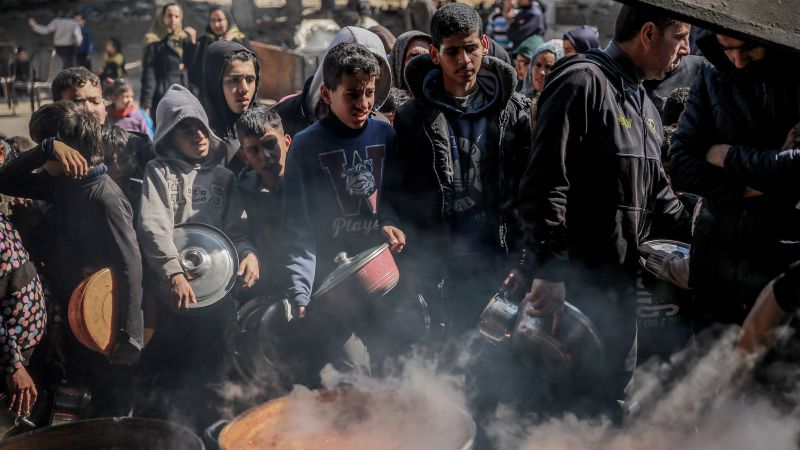AFP/Getty Images/File
Palestinians gather to collect food aid in Beit Lahia in the northern Gaza Strip on February 26.
CNN
—
The United States will begin airlifting food aid to people in the Gaza Strip as the humanitarian crisis deepens and Israel continues to resist opening additional land routes to enable further aid to the war-torn strip. President Joe Biden made the announcement Friday.
Speaking from the Oval Office, Biden said the United States would “do everything in our power” to get additional aid to Gaza, which has been under heavy Israeli shelling since the Oct. 7 Hamast terrorist attack.
“The aid flowing into Gaza is nowhere near enough,” the US president said, noting that “hundreds of trucks” were expected to enter the enclave.
Biden said the United States “will insist on giving Israel more trucks and more routes to get more people the help they need. There will be no excuses.”
He also cited efforts to broker an agreement to free the hostages and secure an “immediate ceasefire” that would allow for additional assistance.
The U.S. military is working to conduct an airdrop within the next few days, a U.S. official told CNN.
The announcement of the US airdrop was a recognition of the dire situation in the Gaza Strip, where Israeli forces opened fire on people waiting for food trucks in the north on Thursday, killing more than 100 people.
Witnesses told CNN, adding that the rescue truck accidentally hit another person as it tried to flee the area, causing further casualties.
The airdrop will provide some relief to those on the ground. However, their use is highly unlikely to provide a sustainable solution to Gaza's humanitarian crisis. That's because each drop can bring only a fraction of the amount of aid that can be transported by truck to the enclave.
Rather, their use highlights the devastating impact of the Israeli government's continued refusal to open more land routes for urgently needed aid. U.S. demands for Netanyahu's government to open more checkpoints in the north have so far failed. In the south, the number of trucks entering war-torn areas fell to just 85 a day last week.
Biden made the announcement as his administration faces harsh criticism at home over its handling of the conflict. The criticism has political implications for the president in an election year.
National Security Council spokesman John Kirby said airdrops “are a complement to ground transportation, not a replacement.”
State Department spokesman Matt Miller said Thursday that the airdrop “will be of immediate use.”
“But the real solution here is to try to get or get agreements that dramatically increase the flow of aid, solve the logistics problems, solve the support problems faced by civilians. I should say, 'so that in the event of an actual intrusion, we can move safely and go to rescue,''' Miller said at a department briefing.
Earlier this week, Jordan, Egypt, the UAE, Qatar and France airdropped relief supplies to various parts of the Gaza Strip, showing how desperate the situation has become.
AFP/Getty Images
Palestinians run along the road as humanitarian aid from Jordan is airdropped into Gaza City on March 1, amid the ongoing conflict between Israel and the Hamas militant group.
Mr Kirby confirmed on Friday that he was in talks with Israel and other stakeholders about the possibility of a maritime corridor for humanitarian aid to Gaza. But a number of logistical challenges will need to be addressed before the corridor becomes operational, US officials told CNN.
U.S. officials have repeatedly pressed Israeli officials in face-to-face meetings about the urgent need to open additional crossings.
“This is a matter of life and death,” said USAID Director Samantha Power, who met with Prime Minister Benjamin Netanyahu and Israeli Defense Minister Yoav Gallant on Wednesday. Power announced $53 million in additional humanitarian aid during a visit to the region this week.
U.S. officials also have ongoing discussions with Israeli officials about the need to ensure the safety of humanitarian aid workers once they enter Gaza.
“Aid workers who are risking their lives on the ground in Gaza to deliver food to people in desperate and hopeless situations, those aid workers must be protected. You have to know that you can do your job without getting shot and killed,” Power said Tuesday.
David Satterfield, the US special envoy for humanitarian affairs in the Middle East, said last month that the convoy was under attack by both “desperate insurgents” and “criminal elements” within the enclave.
Satterfield said the Israeli military had targeted Hamas-run police members accompanying U.N. aid convoys to protect them from looting, so police stopped guarding the convoys.
“The departure of the police escort has made it virtually impossible for the United Nations, Jordan, the UAE and other implementers to move aid safely in Gaza due to criminal organizations,” he said. .
CNN's Oren Lieberman and Samantha Woldenberg contributed reporting.
This story has been interrupted and will be updated.


